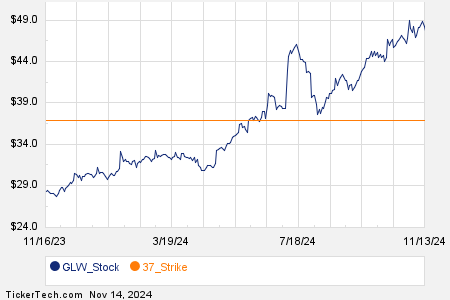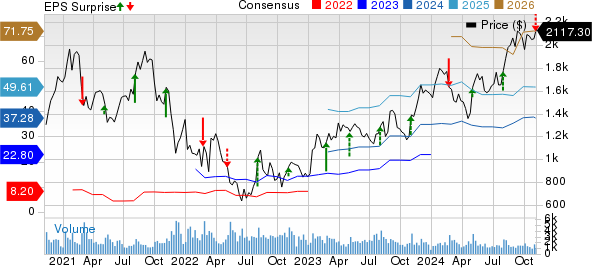Nvidia (NASDAQ: NVDA) stock has been on fire not just in recent months but over the past five years — it’s climbed 2,700% over that time period. Investors are flocking to the stock because it’s a key player in the artificial intelligence (AI) market, one of today’s hottest growth areas. Today’s $200 billion AI market is forecast to reach $1 trillion by the end of the decade, and Nvidia could be one of the biggest winners.
The technology giant has built an AI empire, offering not only the fastest chip around to power AI tasks, but also a full portfolio of related products and services. All of this has helped Nvidia’s earnings to explode higher quarter after quarter. And in recent times, Nvidia’s gains have pushed it to milestones such as becoming the world’s most valuable company — it soared past Apple early last week — and an invitation to join the Dow Jones Industrial Average.
On top of this, Nvidia has two major catalysts on the horizon, events that could be crucial for the direction of the stock price. Should you get in on this top stock ahead of the action? Let’s find out.

Image source: Getty Images.
Customers “begging” for GPUs
First, a quick look at the Nvidia story so far. The company’s graphics processing units (GPUs) are considered the world’s best, and demand for them is high, with the world’s biggest tech companies choosing them above the competition. Oracle co-founder Larry Ellison recently said he and Tesla chief Elon Musk actually “begged” Nvidia for more GPUs.
As mentioned, Nvidia doesn’t just stick to GPUs. The company offers everything a customer may need to launch and maintain its AI projects — and that customer can access Nvidia through any public cloud, making it easy to find the company’s offerings.
All of this has translated into triple-digit quarterly earnings growth, and in the most recent period, Nvidia reported a record $30 billion in revenue. And most importantly, that revenue is resulting in a high level of profit, thanks to gross margin greater than 70%.
Now, let’s consider the two upcoming catalysts: Nvidia’s third-quarter earnings report on Nov. 20 and the launch of its new Blackwell architecture in the fourth quarter. News of any kind — positive or negative — clearly could affect stock performance.
What to expect from Nvidia
Nvidia already has given us a taste of what to expect from both of these much-awaited events. The company predicts double-digit growth in revenue and says it will maintain margins in the mid-70% range. The revenue growth figure may at first look like bad news, considering Nvidia’s string of triple-digit increases. But it’s important to put this into context.
The company’s comparison quarters are getting more and more difficult after such enormous revenue gains over the past couple of years. AI-related revenue was much lower as recently as the 2023 fiscal year. Quarterly data center revenue then came in at less than $4 billion. In the most recent quarter, the second quarter of the 2025 fiscal year, data center revenue climbed to more than $26 billion. It was much easier to grow in the triple digits from $4 billion levels than it will be from current revenue levels.
All of this means a double-digit increase in revenue in the coming quarter would represent strong performance — not a cause for concern. There’s reason to be confident about Nvidia’s ability to meet its earnings forecasts as the company has spoken of sustained high demand for its products and services from quarter to quarter. And the company has established a track record of surpassing estimates, surprising on the upside for at least the past four quarters.
The Blackwell launch
The second catalyst to watch is the actual launch of Blackwell. Nvidia has said it aims to ramp production in the fourth quarter and even expects billions of dollars in Blackwell revenue during that period. If Nvidia meets or beats its goals, the stock could explode higher.
One risk that may lie ahead, though, is the ability to meet demand and smoothly manage the supply chain. Nvidia has said demand for Blackwell surpasses supply and the company expects that to continue into next year. This is positive as it shows customers are eager to get their hands on the new platform, but it could work to Nvidia’s disadvantage if the tech giant falls behind in serving orders. So it will be a point to watch.
Let’s get back to our question: Should you buy Nvidia ahead of these catalysts? Now is a great time to get in on this top AI stock, and if these eagerly awaited events unfold as planned, you may benefit. But it’s important to remember that an immediate gain or decline in the stock price won’t affect your portfolio much if you hold onto the stock for the long term — and long-term investing is the best way to grow wealth.
That means Nvidia is a fantastic AI player to buy today or after the upcoming catalysts as minor short-term news — positive or negative — won’t change the company’s bright future prospects.
Should you invest $1,000 in Nvidia right now?
Before you buy stock in Nvidia, consider this:
The Motley Fool Stock Advisor analyst team just identified what they believe are the 10 best stocks for investors to buy now… and Nvidia wasn’t one of them. The 10 stocks that made the cut could produce monster returns in the coming years.
Consider when Nvidia made this list on April 15, 2005… if you invested $1,000 at the time of our recommendation, you’d have $904,692!*
Stock Advisor provides investors with an easy-to-follow blueprint for success, including guidance on building a portfolio, regular updates from analysts, and two new stock picks each month. The Stock Advisor service has more than quadrupled the return of S&P 500 since 2002*.
*Stock Advisor returns as of November 4, 2024
Adria Cimino has positions in Oracle and Tesla. The Motley Fool has positions in and recommends Apple, Nvidia, Oracle, and Tesla. The Motley Fool has a disclosure policy.




